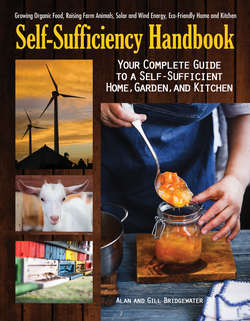Читать книгу The Self-Sufficiency Handbook - Alan Bridgewater - Страница 13
На сайте Литреса книга снята с продажи.
Town Living
ОглавлениеIs it possible to go self-sufficient in a town or the suburbs? Yes. It is very different than trying to go off-grid in the country, but it is a very real option. As for whether or not the town option is a second-best choice for people who aren’t successful going off-grid in the country, facts and figures suggest that going green in town is many people’s first choice.
Then, of course, there are different kinds of towns. A town in the rural United States is going to be very different from a town in middle England, which is going to be very different from a small town in Canada or Australia. For example, I can think of a town in Australia where the population is so low and the development so sprawling that there are parcels of land where people are allowed to keep small livestock, such as chickens, rabbits, and goats, as long as they are securely fenced and housed. I can also think of a large town in Canada where there are areas of farmland right in the middle of the community. That said, no matter the country, the overall differences between town and countryside are going to be broadly the same.
A good-sized yard is an advantage toward eco-friendly town living, especially if you use most or all of the space for food production. If your yard is large enough, you can probably even have one or more greenhouses. We have friends who make it all work by breeding and rearing rabbits in big sheds in the large, walled backyard, growing food on an allotment, and selling surplus in the front yard.
You can also look into renting small pieces of land: unused portions of the neighbors’ yards, small islands of land not used for other purposes, land at the edge of town, and so on. Townspeople generally will not care much about what you are doing as long as it does not impinge upon their space or rights.
Allotments
Allotments are a popular land option in the United Kingdom; they are plentiful and extremely affordable. We know a couple in England who has five plots between them and are completely self-sufficient in vegetables and fresh eggs. Anything they cannot eat, they sell. Much depends upon the area, but most allotment associations traditionally allow the holders to keep small livestock, such as chickens, rabbits, and goats, as long as the animals are securely fenced and housed.
ADVANTAGES
• The frenetic activity—and the feeling that you are at the heart of it—can be inspirational.
• You will be able to draw inspiration from cultural activities in town, such as museums, art galleries, theaters, lectures, and so on.
• The ground is less likely to be affected by severe frosts.
• You can get by with an older car or van simply because there will always be garages and mechanics close at hand.
• You will be able to do part-time paid work to support your go-green activities.
• If you already live in town, you will not be affected by relocation costs.
• Much depends upon your definition of self-sufficiency, but it is possible to dramatically cut food costs by buying perishable foods that you cannot produce yourself.
• If your notion of self-sufficiency has to do with selling produce or other items to raise cash, you can sell at farmers’ markets, craft shows, and the like. With the large potential customer base in town, you will have no problems selling items like goat’s milk, cheese, and fresh vegetables.
• Community gardening is ever growing in towns and suburbs, so you should be able to find and join like-minded groups.
• Your children will have no problems getting to school.
DISADVANTAGES
• Transportation costs can be high if you need to travel out to the country frequently for essential supplies.
• Just as in the country, your livestock need constant care. You will not be able to take a vacation from feeding and tending to the animals.
• When keeping livestock in town, you may run into restrictions such as noise ordinances, the number and type of animals you are allowed to keep, and complaints about odors.
• To an ever-growing extent, mindless vandalism is a part of town living.
Olive trees line the road to a Tuscan farmhouse.
• A self-sufficient setup in town has to be a tighter and more controlled operation than one in the country simply because space is at a premium.
• There is more pollution in a town or suburb.
• Land is more expensive than in the country.
